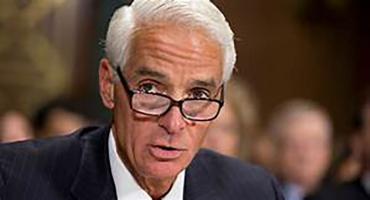By KEVIN DERBY

Charlie Crist
From his seat on the U.S. House Financial Services and General Government Appropriations Subcommittee, U.S. Rep. Charlie Crist, D-Fla., helped amend a funding bill to aid veterans who are using medical marijuana and to boost legal marijuana businesses’ access to banks.
Back in March, Crist unveiled the “Fairness in Federal Drug Testing Under State Laws Act,” a proposal to “remove limitations on federal employment for an individual legally using marijuana under the law of the state in which the individual resides, and for other purposes.” Republican U.S. Reps. Don Young of Alaska and Matt Gaetz of Florida were among the first nine cosponsors.
The Pinellas County Democrat’s office insisted the bill will “protect veterans’ cannabis treatment options and their ability to be employed by the federal government and noted, under current law, “use of marijuana by federal employees is prohibited by law and any use is cause for termination.”
Crist stressed that his proposal would help veterans.
“For our veterans’, cannabis has been shown to address chronic pain and PTSD, often replacing addictive and harmful opioids,” Crist said. “At the same time, the federal government is the largest employer of our veterans’ community. This conflict, between medical care and maintaining employment, needs to be resolved.
“For federal employees complying with state cannabis law, they shouldn’t have to choose between a proven treatment and their job,” Crist added.
“I’m pleased to join Representative Crist in introducing this legislation today. I truly believe that this Congress we will see real reform of our nation’s cannabis laws – reform based on a states’ right approach,” said Young. “This bill would protect federal workers, including veterans, from discrimination should they be participating in activities compliant with state-level cannabis laws on their personal time. The last thing we need is to drive talented workers away from these employment opportunities. As a co-chair of the Congressional Cannabis Caucus, I remain committed to promoting this bill as well as other legislation to protect individuals and reform our federal cannabis laws.”
Crist’s proposal had the support of Americans for Safe Access, Florida for Care, Marijuana Policy Project, National Cannabis Industry Association, NORML, Veterans Cannabis Coalition and Weed for Warriors Project.
“The Fairness in Federal Drug Testing Under State Laws Act prohibits marijuana metabolite testing from being used as the sole factor to deny or terminate federal employment for civilian positions at executive branch agencies if the individual is in compliance with the marijuana laws in their state of residence,” Crist’s office noted. “The bill only extends to an individual’s past, private use of cannabis, and does not prohibit probable cause testing if an individual is believed to be impaired at work.The bill does not apply to individuals occupying or seeking a position requiring a top-secret clearance.”
Added to the U.S. House Appropriations Committee back in January when Democrats took control of the chamber, Crist pointed to the Financial Services funding bill on Monday, noting his proposal has been added to it.
“Voters across the country are saying yes to legalization. It’s time for the federal government to catch up with the will of the people,” said Crist. “For folks from all walks of life, veterans, seniors, people facing chronic pain or disabilities, cannabis is an incredible source of relief – and that legal commerce is providing an economic boost to our communities. You shouldn’t lose your job if you need cannabis to live a healthy, normal life, and companies shouldn’t be at risk of operating a cash-only business in this day and age.”
The funding bill includes a provision which protects federal employees who use medical marijuana in states where it is legal.
“Medical marijuana is currently legal in 33 states, D.C., Puerto Rico, and Guam, and 47 states have some form of legalized cannabis,” Crist’s office noted. “Yet because it is still a ‘Schedule 1′ drug under federal law, federal employees can be denied employment or terminated due to testing positive for marijuana metabolites, even if use is in compliance with state law. This conflict between state and federal laws limits treatment options and federal employment opportunities, particularly impacting veterans who comprise approximately one-third of the federal workforce and for whom medical cannabis is often used to treat chronic pain and PTSD.”
The funding bill also includes language which giving medical marijuana companies more access to banks in states where medical marijuana is legal.
“Even in states that have legalized cannabis, since it is a ‘Schedule 1′ drug banks are liable for financial crimes if they provide services to cannabis companies. As a result, legal cannabis businesses operate as “cash-only” in the U.S.. This puts them and their employees at great risk for being robbed, and, from a regulatory stand-point, all cash operations are difficult to track for taxation purposes and to prevent money laundering schemes,” Crist’s office noted.
Crist is one of more 200 members of the House who signed on as a cosponsor to U.S. Rep. Ed Perlmutter’s , D-Col.,“Secure and Fair Enforcement (SAFE) Banking Act” which “would give legally operating marijuana-related businesses access to the banking system by barring federal regulators from taking action against financial institutions who provide these services to cannabis businesses.” The Pinellas County Democrat was an original cosponsor of the proposal, much of which was included in the funding bill.








